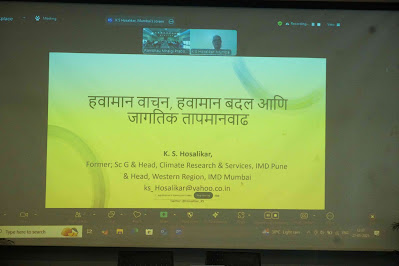Mumbai: 29th May: Modern technology has led to tremendous progress over the past century, but has resulted in unprecedented environmental loss, as it isn’t based on holistic principles. Sustainable development is the only way out if this has to change. Attempts are underway the world over towards this end in which India is at the forefront. A 2-day Sustainable Development Concept Workshop was conducted by Rambhau Mhalgi Prabodhini (RMP) and Thane-based Paryavaran Dakshata Mandal under expert guidance to discuss the direction of development. It highlighted the important role of the ancient Indian philosophy in sustainable growth.
Discussion on water security, climate change and renewable energy
Environment conservation is a multifaceted and complicated subject. To
reach the root cause, introspection and action on various aspects is necessary.
In the beginning Mr. Vidyadhar Walavalkar, Vice-President, Paryavaran Dakshata
Mandal, highlighted the need for comprehensive analysis of the benefits and
environmental losses of a particular developmental project. Dr. Umesh Mundlye, water
conservation and sacred groves researcher, speaking on the availability and use
of water and water security, said, “The prevalent development model focusses on
urbanization and industrialization, and wrong policies therein cause loss of
water sources, agriculture and forests. With right interventions and people’s
participation water conservation is possible.” Commenting on understanding the climate,
climate change and global warming, Mr. Krishnanand Hosalikar, veteran weather
expert, said that predicting
weather patterns would be challenging going forward. Referring to Padma Puraan,
he said that humans won’t face hell if they conserve nature and avoid
pollution. Highlighting the significance of renewable energy, Dr. Priyadarshini
Karve said, “Global warming caused by transition from physical labour and
bioenergy to fossil fuels has necessitated use of renewable energy.”
Species conservation, carbon credits and balanced Indian thought
It is very essential for a biodiversity rich tropical country like
India to protect this heritage. Dr. Milind Watve enlightened those present
about biodiversity and the direction to be taken for conservation. Dr. Ajit
Gokhale explained the often-repeated terms like carbon emissions, carbon
credits and carbon sequestration. Mr. Dilip Kulkarni, advocate of sustainable
lifestyle, said, “Ancient Indian sages had recognized that unbridled
consumption provides temporary gratification and leads to many problems. Definition
of bliss from Taittiriya Upanishad says that such eternal joy is possible by
attaining a Yogic balance by calming the tendencies of organs, mind and
intellect. The polluting development model adopted by the world brings
temporary happiness. Controlled consumption within the framework of the 4
Purusharthas is the key to long-lasting joy. This way humans will move on the
sustainable path.”
Mr. Bhavesh Brahmankar took stock of the international policies and
insisted on the need for coordination at different levels. Dr. Shyam Asolekar
discussed the connection between science, technology and environment. Mr. Ramakant
Bari, entrepreneur from Dombivli, said, “The guidance obtained here brought
clarity in mind about the action we should undertake.” Mr. Shankar Futane,
financial consultant from Nashik, said that with this knowledge he realized
that beyond avoiding plastics, there is need for environmental literacy, just
like financial literacy. In all, 37 men and women researchers, journalists, volunteers, entrepreneurs and engineers working in the
environment sector from Mumbai, Thane, Dombivli, Murbad, Vasai, Mahad, Nashik
and Pune attended the workshop. RMP has been engaged in capacity building,
training, public awareness, research and publication since 1982, and Paryavaran
Dakshata Mandal has been working the areas of environment conservation,
research and education for the past 25 years.

















0 Comments